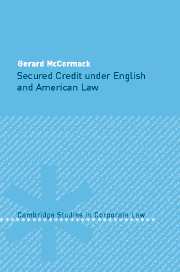Book contents
- Frontmatter
- Contents
- Preface
- List of abbreviations
- 1 The essence and importance of security
- 2 Security rights under English law
- 3 An overview of Article 9 of the Uniform Commercial Code
- 4 Implications of Article 9-type reforms for the English law of security interests
- 5 Notice filing versus transaction filing
- 6 Retention-of-title clauses under English law and Article 9
- 7 Receivables financing
- 8 Security interests in deposit accounts, investment property and insurance policies
- Appendix: Article 9 of the Uniform Commercial Code
- Index
8 - Security interests in deposit accounts, investment property and insurance policies
Published online by Cambridge University Press: 23 July 2009
- Frontmatter
- Contents
- Preface
- List of abbreviations
- 1 The essence and importance of security
- 2 Security rights under English law
- 3 An overview of Article 9 of the Uniform Commercial Code
- 4 Implications of Article 9-type reforms for the English law of security interests
- 5 Notice filing versus transaction filing
- 6 Retention-of-title clauses under English law and Article 9
- 7 Receivables financing
- 8 Security interests in deposit accounts, investment property and insurance policies
- Appendix: Article 9 of the Uniform Commercial Code
- Index
Summary
The revised Article 9 makes it possible to create an Article 9 security interest in deposit accounts as original collateral. The revision to Article 9 followed a long debate. At about the same time, across the Atlantic, the House of Lords in Re BCCI (No. 8) also addressed the issue of security interests in deposit accounts, holding that there was no conceptual barrier at common law to the creation of such an interest. Equally the decision of the House of Lords followed a long period of debate. What is remarkable is that the debate proceeded on each side of the Atlantic almost oblivious to what was happening on the other side. This chapter attempts partly to repair the omission. It also addresses the issue of security interests in investment property and insurance policies where the legislative response to the issue of registration requirements has followed a similarly pragmatic path.
Security interests over deposit accounts in England
In Re BCCI (No. 8) the House of Lords upheld the legal effectiveness of ‘charge-backs’. In other words, the court held that it is possible for a debtor to take a charge over its own indebtedness to a creditor as security for the discharge of some reciprocal obligation, for example, there is no conceptual impossibility in a bank having a charge over a cash deposit made with it by a customer that serves as security for a loan advanced to the customer.
- Type
- Chapter
- Information
- Secured Credit under English and American Law , pp. 249 - 276Publisher: Cambridge University PressPrint publication year: 2004



